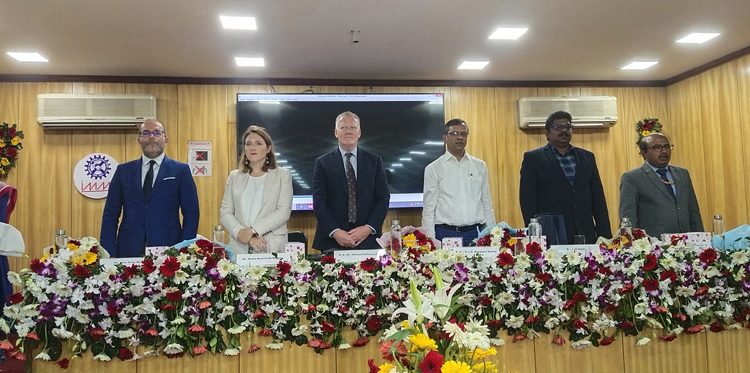Secretary General ISA interacted with CSIR-IMMT scientists working on Technology Development for Recovery of metals from Polymetallic Nodules
Bhubaneswar (Kalinga Voice) : The Secretary General His Excellency Mr. Michael William Lodge and a high-level International Seabed Authority (ISA) delegation visited CSIR-Institute of Minerals and Materials Technology (CSIR-IMMT), Bhubaneswar . The delegation also included Dr. Marie Bourrel McKinnon, Chief of Staff and Head of Strategic Planning Unit, Dr. Jose Dallo Moros, Director, Dr. Sonakshi Mishra, Program Management Officer, and Dr. Madhumita Kothari, Senior Advisor, coordinated by Dr. Sandip Kumar Mukhopadhyay Scientist F, Ministry of Earth Sciences, Govt. of India.
International Seabed Authority and Ministry of Earth Sciences (MoES), Govt. of India, New Delhi exchanged Polymetallic Nodules (PMN) exploration extension contract on the 1st of February 2023 in the presence of Honourable Union Minister Dr. Jitendra Singh, Minister of State (Independent Charge) Earth Sciences and Secretary, MoES, Dr M. Ravichandran. This contract was initially signed on 25thMarch 2002 for a period of 15 years, which later was extended by the authority twice for 5 years period, during 2017 and 2022.
Polymetallic nodules present in the deep sea floor contain metals copper, nickel, cobalt and manganese, which are essential for India’s growth, particularly electric vehicles. India does not have any exploitable land based ores; therefore PMN is an important option. The Government of India’s Vision of New India by 2030 enunciated in February 2019 highlights the blue economy as one of the ten core dimensions of growth. In 2021, the Ministry of Earth Sciences (MoES) of India launched the Deep Ocean Mission to support the development of its blue economy.
CSIR-IMMT has 60 years of experience in research and technology development for the production of metals and materials, including critical metals like nickel, cobalt, vanadium, tungsten, rare earth elements etc. CSIR-IMMT had developed a technology for recovery of copper, nickel and cobalt from PMN and demonstrated in 500 kg nodules/day pilot plant. Currently CSIR-IMMT is working on improving the technology by focussing on recovery of manganese along with the other metals with a keen focus on process energies and emissions.
During their visit, the Secretary General and the ISA delegation visited various departments in CSIR-IMMT.Dr G. Narahari Sastry, Director; CSIR-IMMT explained that our organization also visiting many other institutes and understanding about the potentials, opportunities and the possibilities, that we can work together with the several agencies in India like CSAR, NIO, & amp; NIOT. And we are finding out a new era with several bio-techniques, with the marketing research. Mining materials mineral research, and metallurgy there are several other opportunities in biotechnology. Institute profile and research activities being undertaken at the institute. Dr Kali Sanjay, Chief Scientist and the Project Leader of Polymetallic Nodules programme at CSIR-IMMT detailed the metallurgical activities being undertaken on PMN to the Delegation.
According to ISA Secretary-General, H.R Mr. Michael W Lodge “The progress India has made in the development of processing technology for deep sea minerals is truly remarkable. I look forward to increased collaboration between CSIR-IMMT and the International Seabed Authority in the areas of mineral processing and economics. India is a global leader in metallurgy and by working together we can improve our joint understanding of supply and demand issues for critical minerals for societal development.”

